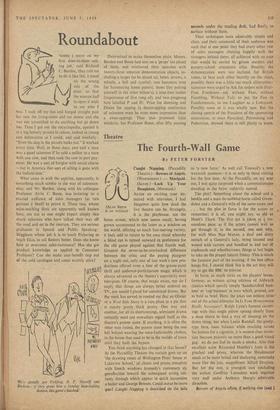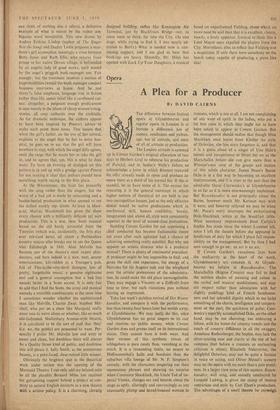Theatre
The Fourth-Wall Game
By PETER FORSTER
Caught Napping. (Piccadilly Theatre.)—Beware of Angels.
(Westminster.) Marigold. (Savoy.)—Lock Up Your Daughters, (Mermaid.) (ALAN BRIEN is on holiday). AFTER an exciting year im- mured with television, I had forgotten quite how dead the live theatre can be. Strangely, it is the playhouse, not the home screen, which now seems small; having grown accustomed to the latter as a window on the world, offering so much fast-moving variety, it feels odd to return to the cosy ritual whereby a blind eye is turned outward in preference for the old game played against that fourth wall. Granted the never-to-be-overlooked difference between the critic and the paying playgoer on a night out, only one of last week's new pro- ductions offered even a hint of the grease-paint thrill and audience-participation magic which is always advanced as the theatre's superiority over television. Of course, that magic exists, nor do I imply that things are always better ordered on TV, nor would I plead for committed drama. But the week has served to remind me that an Olivier or a West Side Story is a rare plum in a pie that is mostly pretty , thick pastry. One way and another, for all its shortcomings, television drama certainly need not nowadays regard itself as the theatre's poorer sister. If anything, it is often the other way round, the poorer sister being the one left behind wearing the once-fashionable clothes, in the house that used to be in'the middle of town until they built the bypass.
You think anything has changed in that house?
At the Piccadilly Theatre the curtain goes up on 'the drawing room of Wellington Potts' house at Lakeview School,' all chintz and prints, complete with french windows (comedy's customary sly genuflection toward the subsequent acting edi- tion), through which appear in quick succession a butler and George Benson. Could status be more quo? Caught Napping is described on the bills as 'a new farce.' As well call Tussaud's a new waxwork museum—it is so only to those visiting for the first time. At the Piccadilly, on my way out, I was quite surprised when a commissionaire standing in the foyer suddenly moved.
The plot? Something about the school and a bookie and a must-be-nobbled horse called Gwen- dolen and a General's wife of the same name and . . . but the plot in farce is for the actors to remember; it is all, you might say, as old as Noah's Thark. The first act is taken at a tre- mendous pace, as if the actors cannot wait to get through it; in the second, one sees why, for with Miss Nan Munro, a deaf and do- tty ostrich of a General's lady, being lassoed and wooed with carrots and bundled in and out Of cupboards and wheelbarrows, things at last begin to take on the proper lunatic frenzy. This is much the funniest part of the evening; if the box office hangs fire, I should think this is the act they will try to get the BBC to televise.
In farce, so much turns on the players' inven- tiveness, as witness acting editions of Aldwych classics which specify simply 'handkerchief busi- ness' or 'cup business' in texts which, printed, are as bald as brief. Here, the jokes too seldom arise out of the actual dilemma. In Is Your Honeymoon Really Necessary?, Ralph Lynn's famous cavort- ings with that single pillow sprang clearly from a deep desire to find a way of sleeping on the damn thing; but when Leslie Randall, the goofy- type here, loses balance while reaching across his hostess for a cigarette, it is second-class inven- tion because patently no more than a good visual gag: we do not feel he needs a smoke. Also that excellent actor Raymond Huntley's forte is the pinched and prissy, whereas the Headmaster needs to be more brutal and deafening, somebody more like the late, magnificent Alfred Drayton. But for the rest, a youngish cast (including the author. Geoffrey Lumsden) work together very well under Anthony Sharp's admirable direction.
Beware of Angels offers, if nothing else (and I can think of nothing else it offers), a definitive example of what is meant by the rather am- biguous word novelettish. This new drama by Audrey Erskine • Lindop (author of The Singer Not the Song) and Dudley Leslie proposes a mur- derer's girl accomplice, seemingly a cross between Betty Jones and Ruth Ellis, who returns from prison to her native Devon village, is befriended by an angelic lady of good works, until wooed by the angel's priggish bank-manager son. Fair enough : but the treatment involves a morass of improbabilities (would the bank manager conduct business interviews at home. And be just thirty?), false emphases, language true to fiction rather than life, comic relief like a cardboard cut- out; altogether, a poignant enough predicament is seen merely in the idiom of cheap women's-mag. stories, all cosy catharsis over the cocktails. As for dramatic technique, the authors appear to have been inspired by Pinero's advice to make each point three times. This means that when the girl's father, on the eve of her arrival, explains to the angel that he has to enter hos- pital, he goes on to say that the girl will have nowhere to stay, with which the angel duly agrees, until she twigs that he wants her to take the girl in, and he agrees that, yes, this is what he does want. To have an evening of dialogue on this pattern is to end up with a grudge against Pinero for not making it clear that authors should have something worth saying in the first place..
At the Westminster, the fault lies primarily with the song rather than the singers, but the worst of a bad job is made by miscasting and a leaden-heeled production in what seemed to me the dullest weekly rep. idiom. At least in Mari- gold, Murray Macdonald has given the show every chance with a brilliantly delicate yet sure production. This is a wee, twee Scots musical based on the old hardy perennial from the Twenties (which was, incidentally, the first play ever televised here), all about a Peeblesshire country mouse who breaks out to see the Queen visit Edinburgh in 1841. Alan Melville has become one of the theatre's most expert play- doctors, and here indeed is a nice, neat, .neuter entertainment, kilt-ridden as a Younger's pub, full of This-is-the-very-devil dialogue, lots of pretty, forgettable music, a genuine eightsome reel and a general assumption that a bad line sounds better in a Scots accent. It is only fair to add that I find the Scots, the army and musical comedy a resistible combination; at the same time I sometimes wonder whether the sophisticated men like Melville, Charles Zwar, Stephen Mit- chell, who put on a show like Marigold, really enter into its naïve idiom or whether, like so much old-fashioned, Shaftesbury Avenue-style theatre, it is calculated to be the sort of stuff that 'they' (i.e. we, the public) are presumed to want. Per- sonally I prefer Mr. Melville low and witty to sweet and clean, but doubtless there will always be a Quality Street kind of public, and doubtless this will please it. Sally Smith, as the untimorous beastie, is a peke-faced, clear-voiced little winner.
Obviously the brightest spot in the theatrical week under review was the opening of the Mermaid Theatre. I can only add my belated mite to all the plaudits Bernard Miles has received for galvanising support behind a project so con- trary to natural English instincts as a new theatre
ith a serious policy. It is a charming, cleverly
designed building, rather like Kensington Air Terminal, just by Blackfriars Bridge—not, as some seem to think, far into the City. (At one stage, while trying to find it, I was nearly ad- mitted to Bart's.) What is needed now is con- .tinuing support, and I am glad to hear that bookings are heavy. Shrewdly, Mr. Miles has opened with Lock Up Your Daughters, a musical
based on unperformed Fielding, about which no more need be said than that it is excellent, cheery, bawdy, a lively appetiser. Ironical to think that a Lord Mayor once expelled the players from the City. Marvellous, also, to reflect that Fielding was a magistrate. If only there were somebody on the bench today capable of producing a piece like this!







































 Previous page
Previous page